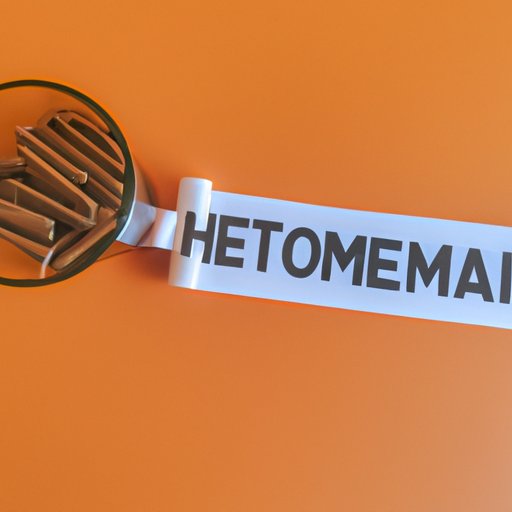
Introduction
Hemorrhoids are a common condition that affect many people, yet it’s not often talked about. Hemorrhoids are swollen veins in the anus and lower rectum, which can be internal or external. While they’re not life-threatening, they can certainly be uncomfortable and impact your quality of life. In this article, we’ll discuss prevention, remedies, medical treatments, and tips for sitting and standing when dealing with hemorrhoids.
Lifestyle Changes that can Help Prevent or Minimize Hemorrhoid Symptoms
Prevention is key when it comes to hemorrhoids. Here are some lifestyle changes that can help prevent or minimize hemorrhoid symptoms:
- Drinking more water: Proper hydration is important to keep your bowel movements regular and prevent constipation, which can lead to hemorrhoids. Drinking at least 8 glasses of water a day is recommended.
- Eating a high-fiber diet: A diet high in fiber helps to soften stool, making it easier to pass without straining, which can cause hemorrhoids. Whole grains, fruits, vegetables, and beans are all good sources of fiber.
- Exercising regularly: Exercise can help to increase blood flow and prevent constipation, which can help prevent hemorrhoids. Even a 20-minute walk each day can help.
- Avoiding straining during bowel movements: When going to the bathroom, it’s important not to strain. Instead, take your time, relax, and let nature take its course.
At-Home Remedies for Hemorrhoids
If you do end up with hemorrhoids, there are some at-home remedies that can help ease symptoms:
- Warm Sitz Baths: Soaking in a warm sitz bath for 10 to 15 minutes a few times a day can help to relieve pain and itching.
- Witch Hazel Compresses: Witch hazel is a natural anti-inflammatory, and applying it to the affected area can help to reduce swelling and alleviate pain and itching.
- Over-the-Counter Creams and Ointments: There are several creams and ointments available over-the-counter that can help to reduce pain and itching associated with hemorrhoids. Be sure to read the label and follow the instructions carefully.
- Proper Cleaning of the Area: Keep the area clean and dry by gently wiping with unscented, alcohol-free wipes after using the bathroom. Avoid using rough toilet paper, as it can be irritating.
Medical Treatments for Hemorrhoids
If at-home remedies aren’t enough to alleviate symptoms, there are medical treatments available, including:
- Prescription Suppositories: Suppositories that contain hydrocortisone can help to reduce inflammation and alleviate symptoms.
- Surgery: In severe cases, surgery may be necessary to remove hemorrhoids. Your doctor can discuss surgical options with you.
Tips for Sitting and Standing with Hemorrhoids
Sitting and standing can be uncomfortable when dealing with hemorrhoids, but there are some tips that can help:
- Using cushions: A cushion or pillow can help to relieve pressure on the affected area when sitting. There are specifically designed cushions for hemorrhoids available.
- Taking breaks to stand and stretch: If you need to sit for long periods, take breaks every hour to stand up and stretch.
- Avoiding sitting for prolonged periods: If possible, avoid sitting for prolonged periods altogether. Consider using a standing desk or taking frequent walking breaks throughout the day.
When to Seek Medical Attention for Hemorrhoids
While hemorrhoids can be uncomfortable, they’re generally not serious. However, there are times when you should seek medical attention:
- When symptoms do not improve with home remedies: If you’ve tried at-home remedies for several weeks and your symptoms haven’t improved, it’s time to see a doctor.
- When symptoms are severe: If you experience severe pain, heavy bleeding, or a lump protruding from the anus, seek medical attention immediately.
Conclusion
Hemorrhoids can be uncomfortable, but they’re also generally preventable and treatable. Make lifestyle changes like increasing water and fiber intake, exercising regularly, and avoiding straining during bowel movements. Use at-home remedies like warm sitz baths and witch hazel compresses to alleviate symptoms and consider medical treatments like prescription suppositories or surgery if necessary. Don’t let hemorrhoids impact your quality of life, seek medical attention if symptoms persist or become severe.




